Table of content
Exceptional customer experience and loyalty are the keys to running a successful retail business in 2024. With thousands of brands to choose from, customers tend to fall for the ones that market their products with high-quality personalized content and offer the best customer service.
Thankfully, the retail industry now has a solution in the form of generative AI, which allows them to enhance their services while meeting their growth targets. According to McKinsey, generative AI can boost productivity in the retail sector by around 1-2% of global revenues, which is estimated to fall between $400B - $660B per year.
Read on to learn more about the applications of generative AI in retail.
Significance of Staying Updated with AI Trends
ChatGPT, Bard, Copy.AI, and DALL-E have quickly become buzzwords as businesses have begun to realize their potential in improving operational efficiency. But what if your business never knew about generative AI?
That’s right - success in the retail landscape is synonymous with staying updated. In order to stay one step ahead of your competition, you need to be aware of the latest trends in AI and keep an eye out for solutions that can improve your workflow.
Your customers are not willing to wait for webpages to load and carry out extensive searches to find the right product. Instead, they expect to see relevant content right from the moment they land on your brand website. In fact, 73% of customers expect your brand to know their preferences.
It's no surprise that 82% of organizations are currently using or considering generative AI as the technology that will transform their industry. It allows you to automate repetitive tasks and unlocks new business opportunities.
Generative AI Retail Use Cases
The use cases of generative AI in retail go far beyond enhancing customer experience and creating unique content. It provides business owners with valuable insights to make informed decisions while providing creative assistance in the form of unique texts, graphics, audio, and video.
The following are the most notable generative AI use cases for retail:
Personalized Product Recommendations
71% of customers want retailers to show personalized product recommendations, and 76% are frustrated when this is not the case. Generative AI allows you to analyze large amounts of customer data such as shopping history, items added to a cart, searches, and demographics.
This level of customer behavior analysis means that you can understand your buyers' personal preferences and likings. As a result, your product recommendations are not only more personalized, meaning you have much better chances of improving customer engagement.
The best example of the application of generative AI to create personalized recommendations can be seen in none other than Amazon. The retail giant uses generative AI to analyze customers’ past purchases and searches to offer highly personalized product recommendations. As a result, the shopping experience is enhanced and customers see products that are relevant to their interests.
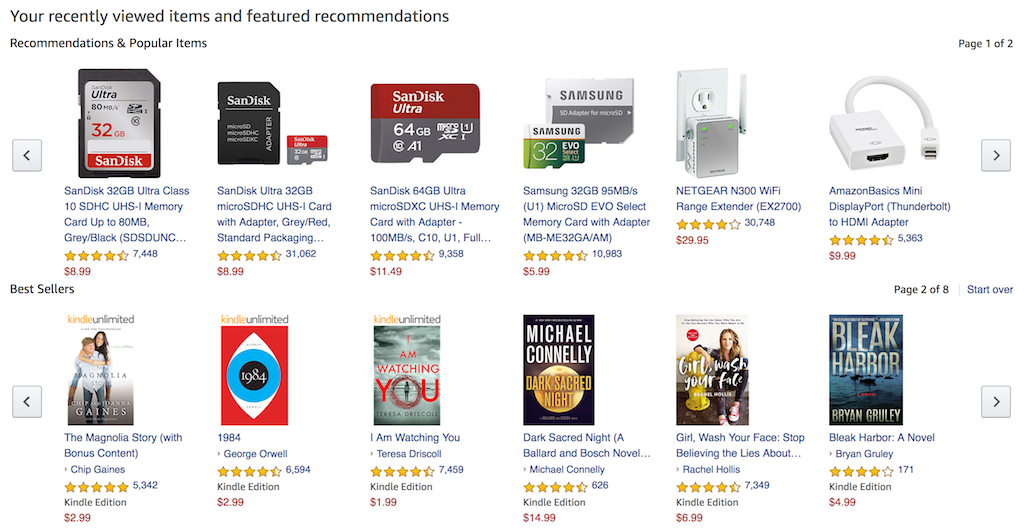
That being said, offering such recommendations is not possible without specialized software working its magic in the backend. For instance, shopdev’s very own Recommendation Engine, which is part of its next-generation operating system XStak, provides accurate and personalized suggestions to improve customer engagement and increase AOV in leading retail brands.
Virtual Try-Ons and Fittings
One of the problems customers face while shopping for clothes and other wearables online is knowing whether the size will fit perfectly. Now, retailers can offer customers immersive and interactive shopping experiences through generative models and computer vision. With generative AI, you can use conversational virtual assistants that help customers through their online shopping journeys.
Virtual try-ons and fittings with generative AI allow customers to see how the apparel and accessories, or even furniture items they buy online will fit them and their spaces. This reduces the hesitation that customers feel while shopping for wearables online and also eliminates the need to visit brick-and-mortar stores for try-ons. In this way, the use of generative AI in virtual try-ons reduces product return rates and improves customer satisfaction rates in retail.
Zolando is one of the leading fashion retail brands that has introduced a virtual try-on room for online shoppers.
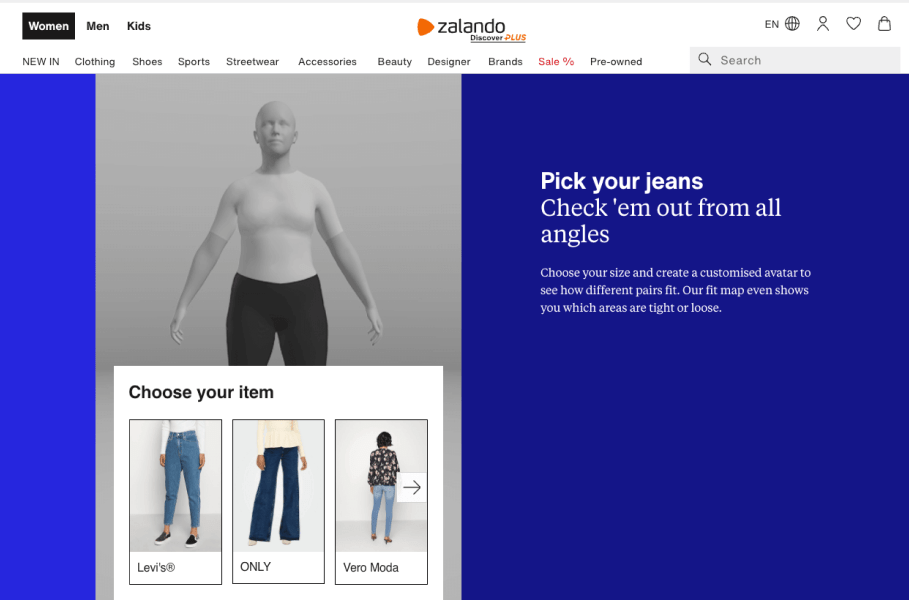
Using machine learning models, computer vision, and other AI tools, the brand’s fitting room predicts the right sizes for customers. Although the virtual try-on model is still in its infancy, more than 30,000 customers have already tried it.
Dynamic Pricing Optimization
Dynamic pricing allows retailers to get a competitive advantage and target the right customers. Both price elevations and discounts account for a higher number of sales when done smartly. Speaking of smart solutions, you don’t need to look further than generative AI to get your prices right. Generative AI factors in customer data, demand, competitor pricing, and ongoing trends to optimize prices in real time.
Not only that, but retailers are also using generative AI to create personalized discounts based on customer data analysis. This helps curate custom shopping journeys and provide customers with relevant content, ultimately helping retailers boost sales and loyalty.
One of the best examples of dynamic pricing in retail is seen in Walmart Marketplace. The renowned retailer allows sellers to adjust their prices in real-time to stay competitive and boost their profits. This is made possible by a generative AI-based Repricer tool that allows third-party sellers to take control of their own dynamic pricing strategies. These strategies consider Walmart.com prices and the prices of the given products on other eCommerce sites to set up the right prices.
Looking for a Generative AI Solution?
Get in Touch with shopdev’s AI/ML Developers Today!
AI-Powered Visual Search
Visual search is a useful feature in retail that allows customers to find the right products using images uploaded to engines like Google Lens and Pinterest Lens. Generative AI plays a major role in making visual search possible, as it analyzes and extracts important features from images to help find similar products.
When customers upload images of products they want to find, the generative AI system picks particular features from the image to enhance product discovery and shows similar products available on the market. This significantly improves the shopping experience as customers do not have to try entering different product names to find what they need.
For example, Forever 21 has adopted the visual search feature to offer better shopping experiences to its customers. The brand is an advocate for the visual way of going about product searches and purchases. It aims to use visual product discovery with AI to make online shopping more convenient.
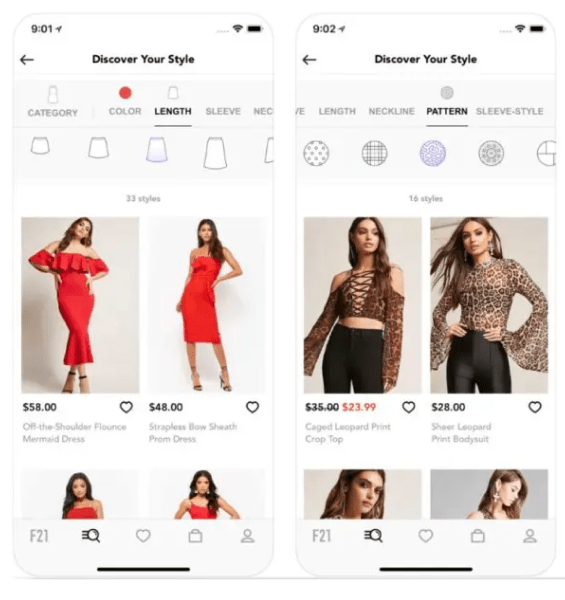
If you are thinking about incorporating a visual search feature in your retail brand, look no further. Our expert software engineers at shopdev have developed and rolled out an Image Similarity module as part of our retail operating system known as XStak. The system is helping retailers improve their brand image by enabling customers to easily find their desired products. Shoppers get instant access to product details and can make their purchases confidently.
Automated Customer Service and Chatbots
Providing customers with fast responses is key to improving satisfaction rates and gaining loyalty. Fortunately for retail businesses, generative AI can help automate customer services with the help of intelligent chatbots. AI can provide answers to customer queries based on their history and demographic information.
It also provides personalized support and recommendations with the help of conversational interfaces. In this use case, generative AI makes use of natural language processing and large language models (LLMs) to resolve customer queries as fast as possible. This helps create a flawless shopping experience and allows retailers to boost the efficiency of their customer support processes.
Retail brand American Eagle gives us an example of AI being put to use in customer support. The brand has demonstrated customer service innovation by leveraging AI to transform its in-store dressing rooms. By using computer vision and machine learning to analyze a customer’s clothing preferences, size, and skin tone, American Eagle offers them the most suitable products that are likely to fit well.
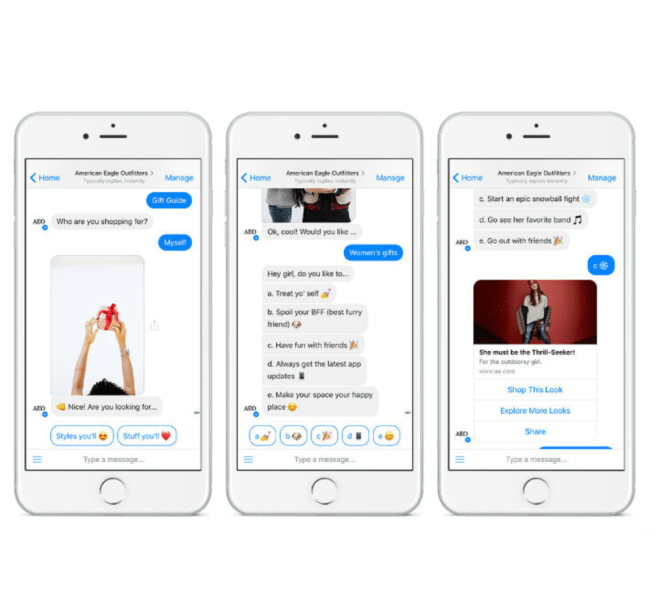
With the help of AI, the brand has significantly enhanced the shopping experience and made it highly personalized. As a result, retail customers get served in the best way possible using the best-in-breed technology.
Inventory Management and Demand Forecasting
Supply chain and shipping issues are the constant companions of every retail business. As these issues became common during the pandemic, more and more retailers have now adopted automated inventory management and demand forecasting systems. Here, generative AI helps retailers analyze sales data and manage their inventory effectively.
It forecasts trends by processing and analyzing historical data, customer demands, and competitor data to make better decisions while ordering inventory items. This helps prevent over-ordering, stockouts, and dead inventory - hence optimizing your supply chain and delivery processes.
H&M, a leading retail fashion brand, has implemented AI to improve inventory management. The AI algorithms capture data from search engines and blogs to learn about the latest fashion trends. This data clarifies how much customers are paying, what they are buying, and what kind of shopping channels they are using. This helps H&M make informed decisions about restocking popular items and smartly distributing them throughout their franchises.
Looking for a Generative AI Solution?
Get in Touch with shopdev’s AI/ML Developers Today!
Customer Sentiment Analysis
Knowing what your customers think about your brand and your products is crucial to improving sales. Sentiment analysis is one of the tactics that allows retailers to get a better understanding of how customers feel about their products. While the most basic way of performing sentiment analysis is to analyze online reviews, generative AI takes it to another level.
You can now analyze any kind of text with generative AI to understand whether your customers are demonstrating positive, negative, or neutral sentiments for your products. Furthermore, AI algorithms are now advanced enough to understand new texts apart from the data they are trained on.
As an example of a retail brand using AI for customer sentiment analysis, we look back at the biggest online retailer of them all - Amazon. The platform’s AI tool Amazon Comprehend analyzes customer sentiments from product reviews and categorizes them based on positive, negative, and neutral sentiments.
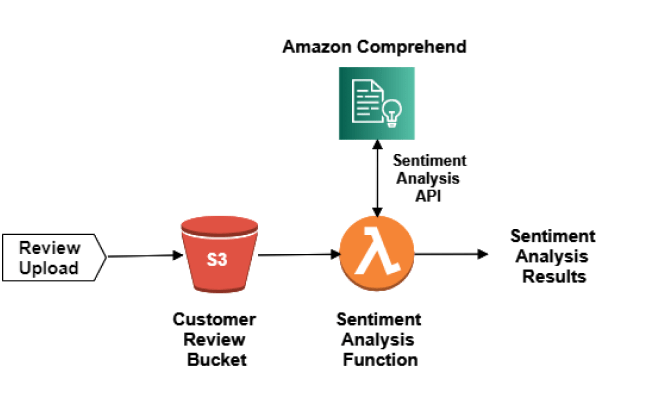
This helps Amazon identify loopholes and work on improving the products and services that generate negative sentiments. By better understanding what customers expect and want, the retail giant continues to improve its service quality.
Fraud Detection and Prevention
Last but not least, generative AI also finds a useful application in fraud detection and prevention. The retail sector is quite used to concerns of fake purchases and returns in fraudulent efforts to gain easy money. In such scenarios, generative AI algorithms can save retailers a lot of money by detecting fraudulent transactions.
Not only does AI prevent fraud from the customer end, but also identifies counterfeit products from unauthorized sellers in online marketplaces. The algorithms can pinpoint deviations from normal behavior in transactions and inconsistencies in product descriptions, hence helping prevent fraud.
Walmart demonstrates an example of AI being used for fraud prevention in retail. The retail chain has filed a patent for a machine learning system that can detect fraudulent transactions. The AI-based system is trained on past payment transfer data to detect deviations in payment patterns. It is capable of detecting a fraudulent payment transfer the moment it is initiated or received by a user.
AI Adoption and Integration Challenges For Retailers
Although generative AI is gaining popularity at a fast pace, many businesses are still facing challenges in utilizing its full potential. For instance, many startups and mid-sized retail businesses do not have the understanding and expertise required to implement AI in their systems.
Bias and Poor Quality Data
As mentioned earlier, generative AI models need to be trained on extensive, high-quality data to be able to produce accurate results. This is a challenge for retailers as they cannot guarantee that the data used to train the AI models will not be biased, unethical, or of poor quality.
Complexity of AI Models
Even when you think you can gather the right data, there is the next challenge of understanding and interpreting the generative AI model. Only AI experts can understand why a model makes a particular decision in a given scenario. For retailers, the decisions or outputs are often unexpected, making them question the reliability of AI tools.
That being said, making your mark in the competitive retail environment does require high brand visibility and exceptional customer service. In order to ensure that your brand stays on top, you need to consider these integration challenges as stepping stones towards business growth. After all, the result of successfully incorporating generative AI into your business will be a significant competitive advantage. And in retail, that is all you need.
Key Takeaways
Establishing a retail brand in 2024 requires a deep understanding of customer preferences and competitor strategies. By using generative AI, you can stay ahead of the competition and come up with not one but multiple strategies to pull more and more customers. As AI tools accelerate your business operations, you can offer your customers smooth shopping experiences that make them come back for more.




